The Papillary Thyroid Cancer Market is estimated to be valued at USD 3.2 billion in 2025 and is projected to reach USD 5.1 billion by 2035, registering a compound annual growth rate (CAGR) of 4.8% over the forecast period.
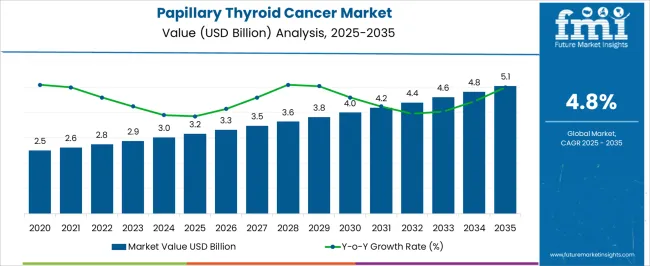
| Metric | Value |
|---|---|
| Papillary Thyroid Cancer Market Estimated Value in (2025 E) | USD 3.2 billion |
| Papillary Thyroid Cancer Market Forecast Value in (2035 F) | USD 5.1 billion |
| Forecast CAGR (2025 to 2035) | 4.8% |
The papillary thyroid cancer market is experiencing steady expansion, influenced by rising incidence rates of thyroid malignancies globally and the continued emphasis on early detection and treatment. Growing awareness among patients and healthcare providers, combined with advancements in diagnostic imaging and biomarker research, is contributing to higher diagnosis rates and timely intervention. Significant progress in surgical techniques, radioactive iodine therapy, and targeted drug development is expanding treatment options and improving patient outcomes.
The availability of personalized treatment approaches, supported by genetic testing and molecular profiling, is further shaping therapeutic decisions and broadening clinical adoption. Rising healthcare investments and improved reimbursement frameworks in both developed and emerging markets are encouraging patients to seek advanced care.
In addition, the aging population and increasing exposure to risk factors such as radiation and lifestyle-related conditions are contributing to rising case numbers With continuous innovation, enhanced survival rates, and growing patient engagement, the papillary thyroid cancer market is expected to remain on a positive trajectory, with ongoing opportunities for therapeutic development and clinical integration.
The papillary thyroid cancer market is segmented by treatment, end user, and geographic regions. By treatment, papillary thyroid cancer market is divided into Surgery, Iodine Therapy, Thyroxin Treatment, External Radiotherapy, Chemotherapy, Cisplatin, Doxorubicin, Drugs, Levothyroxine, and Radioiodine. In terms of end user, papillary thyroid cancer market is classified into Hospital, Oncology Centres, Hospital Pharmacies, and Retail Pharmacies. Regionally, the papillary thyroid cancer industry is classified into North America, Latin America, Western Europe, Eastern Europe, Balkan & Baltic Countries, Russia & Belarus, Central Asia, East Asia, South Asia & Pacific, and the Middle East & Africa.
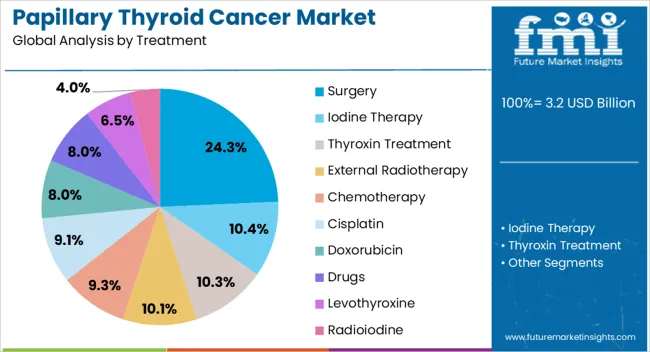
The surgery segment is projected to account for 24.3% of the papillary thyroid cancer market revenue share in 2025, making it the leading treatment category. Its leadership is being driven by the continued reliance on surgical removal of thyroid tumors as the primary and most effective intervention for localized disease management. Advances in surgical precision, including minimally invasive and robotic-assisted techniques, are improving patient recovery times, reducing complication risks, and enhancing clinical outcomes.
The preference for surgery is further supported by its ability to provide definitive treatment in early-stage cancers, thereby reducing recurrence risks and improving long-term survival rates. Increased availability of highly trained surgeons and the adoption of advanced intraoperative monitoring technologies are also reinforcing the role of surgery as a standard of care.
Growing investments in healthcare infrastructure across developed and emerging economies are facilitating access to surgical services, further boosting segment adoption As clinical guidelines continue to prioritize surgery for localized papillary thyroid cancer, the segment is expected to maintain its dominance within the overall treatment landscape.
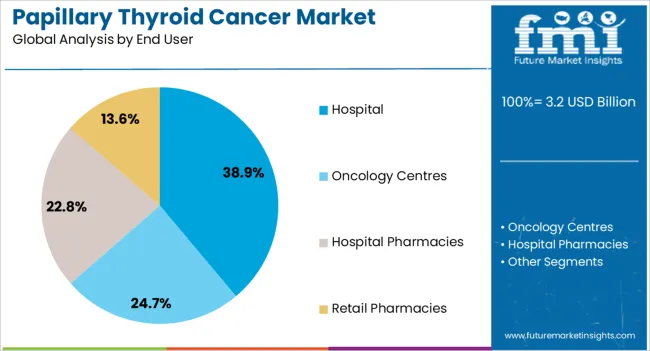
The hospital segment is expected to represent 38.9% of the papillary thyroid cancer market revenue share in 2025, positioning it as the dominant end user. Hospitals remain the central point of care delivery for cancer diagnosis, treatment, and post-operative management, owing to their comprehensive infrastructure, multidisciplinary expertise, and advanced surgical facilities.
The segment’s leadership is being reinforced by the growing patient preference for hospital-based treatment, where access to specialized oncologists, endocrinologists, and surgeons ensures integrated and personalized care. Hospitals are also increasingly adopting advanced imaging systems, molecular diagnostic tools, and robotic surgical platforms, which enhance treatment precision and patient safety.
Rising healthcare expenditure and the availability of reimbursement support in hospital settings are encouraging patients to seek treatment in these facilities, further strengthening their market position As the incidence of papillary thyroid cancer rises globally, hospitals are playing a crucial role in delivering large-scale, high-quality treatment services, making them the preferred end user segment in the market’s growth trajectory.
Papillary thyroid cancer (PTC) also called papillary carcinoma is one of the most common type of thyroid cancer and it is most curable among other cancers. Follicular cancer, medullary cancer, and anaplastic cancer are other types of thyroid cancers.
The prevalence rate of papillary thyroid cancer is 0.5-10 per 100,000 population. Papillary thyroid carcinoma presents as asymptomatic thyroid nodules, increasing the size of nodule in patient is the primary symptom for this disease.
Cough, dyspnea and dysphagia are the severe stage symptoms of papillary thyroid cancer and lump or swelling in the neck parts are the physical symptoms of the papillary thyroid cancer. Age, gender and exposure to radiation affect the risk of papillary thyroid cancer.
Itis more common in women than in men, and often occurs before age 45. People who have been exposed to large amounts of radiation, or who have had radiation therapy for medical problems in the head and neck have a more chance of getting thyroid cancer.
To treat papillary thyroid cancer various methods are available which include surgical procedure, iodine therapy, thyroxin treatment and external radiotherapy. In surgical procedure, surgeon removes affected tissue from the neck.
Iodine therapy is given to the patient post operatively to destroy normal thyroid remnants. External radiotherapy is indicated for the patients with age group 45 years and above.
The growth of thyroid tumor cells are controlled by thyrotropin and is inhibited by thyroxin, inhibition of thyrotropin with thyroxin increase the recurrence of survival rates. The most commonly used drugs in the treatment of papillary thyroid cancer are levothyroxine and radioiodine and antineoplastic agents such as cisplatin, doxorubicin and these drugs are used after the surgery and radiation therapy.
In 2025, According to American Cancer Society (ACS), thyroid cancer accounts 47,230 in women and 15,220 in men in the USA and the incidence rate and mortality rate of thyroid cancer is high in women than in men.
Thus, the increasing prevalence and incidence rate of thyroid cancers is expected to drive the overall papillary thyroid cancer. Increasing awareness about the cancer disease, raising government funds and reimbursement policies from Medicare and Medicaid are the key factors which are expected to propel the overall papillary thyroid cancer treatment market.
The cost of the drugs and procedures is one of the major restraint for papillary thyroid cancer treatment market.
Depending on geographic region, papillary thyroid cancer market is segmented into seven key regions: North America, Latin America, Europe, Asia Pacific, and Middle East & Africa. North America is estimated to contribute maximum revenue share in the global market of Papillary Thyroid Cancer followed by Europe.
Asia Pacific regions is expected to grow at a higher growth rate owing to high occurrence of cancer diseases. Middle East & Africa is expected to show a healthy growth rate in the forecast period
Key players of papillary thyroid cancer market are Mylan pharmaceuticals Inc., Baxter International Inc., Alara Pharmaceutical Corporation, Abbott laboratories, Bristol Myers co., Teva parenteral medicines Inc., Jerome Stevens Pharmaceuticals Inc., and App pharmaceuticals llc.
The research report presents a comprehensive assessment of the market and contains thoughtful insights, facts, historical data, and statistically supported and industry-validated market data. It also contains projections using a suitable set of assumptions and methodologies. The research report provides analysis and information according to categories such as market segments, geographies, types, technology, material and applications.
The market is expected to witness an unprecedented surge in the upcoming years owing to the development of novel options for treating papillary thyroid cancer. There is a growth in government funding for the advanced made in the papillary thyroid cancer market.
Furthermore, private organizations and governments across the developing regions are spreading awareness about the diseases, coupled with increased healthcare expenditure, which is expected to reshape the landscape of the papillary thyroid cancer market. With a remarkable rise in research and development activities, along with clinical trials going uphill, it is estimated that favorable opportunities are going to unravel for key market players.
Although the market has healthy growth, it is anticipated that the high cost associated with the treatment and side effects of the drugs and therapies conducted is likely to impede the growth of the market in the forthcoming years.
Due to the existence of numerous international and regional companies, the market for polymer emulsions is very competitive. To strengthen their position in the market, major players are implementing a variety of methods, including treatment portfolio growth and regional development. The key players are adopting various business strategies, such as mergers and acquisitions, to expand their geographic presence and consumer base across the world.
The increasing prevalence of cancer is aiding the growth of reimbursement policies from Medicaid and Medicare. This is further expected to make a significant contribution to the advancement of the market throughout the forecast period. Therefore, the papillary thyroid cancer market is estimated to revamp its market share through 2035.
The report is a compilation of first-hand information, qualitative and quantitative assessment by industry analysts, inputs from industry experts and industry participants across the value chain. The report provides in-depth analysis of parent market trends, macro-economic indicators and governing factors along with market attractiveness as per segments. The report also maps the qualitative impact of various market factors on market segments and geographies.
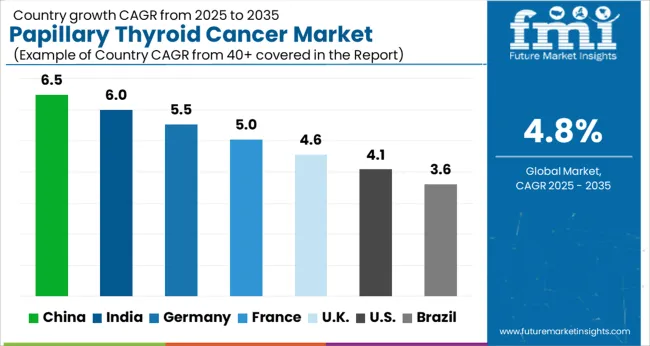
| Country | CAGR |
|---|---|
| China | 6.5% |
| India | 6.0% |
| Germany | 5.5% |
| France | 5.0% |
| UK | 4.6% |
| USA | 4.1% |
| Brazil | 3.6% |
The Papillary Thyroid Cancer Market is expected to register a CAGR of 4.8% during the forecast period, exhibiting varied country level momentum. China leads with the highest CAGR of 6.5%, followed by India at 6.0%. Developed markets such as Germany, France, and the UK continue to expand steadily, while the USA is likely to grow at consistent rates. Brazil posts the lowest CAGR at 3.6%, yet still underscores a broadly positive trajectory for the global Papillary Thyroid Cancer Market. In 2024, Germany held a dominant revenue in the Western Europe market and is expected to grow with a CAGR of 5.5%. The USA Papillary Thyroid Cancer Market is estimated to be valued at USD 1.1 billion in 2025 and is anticipated to reach a valuation of USD 1.7 billion by 2035. Sales are projected to rise at a CAGR of 4.1% over the forecast period between 2025 and 2035. While Japan and South Korea markets are estimated to be valued at USD 169.3 million and USD 104.4 million respectively in 2025.
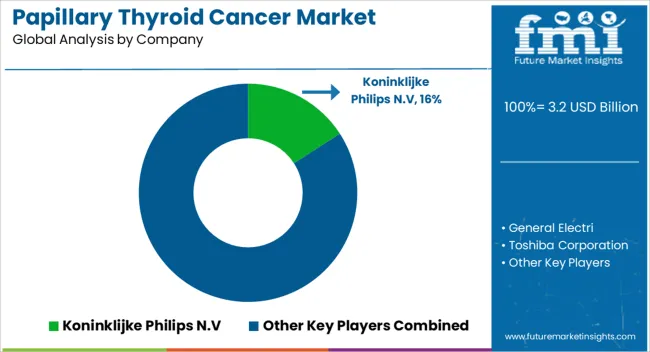
| Item | Value |
|---|---|
| Quantitative Units | USD 3.2 Billion |
| Treatment | Surgery, Iodine Therapy, Thyroxin Treatment, External Radiotherapy, Chemotherapy, Cisplatin, Doxorubicin, Drugs, Levothyroxine, and Radioiodine |
| End User | Hospital, Oncology Centres, Hospital Pharmacies, and Retail Pharmacies |
| Regions Covered | North America, Europe, Asia-Pacific, Latin America, Middle East & Africa |
| Country Covered | United States, Canada, Germany, France, United Kingdom, China, Japan, India, Brazil, South Africa |
| Key Companies Profiled | Koninklijke Philips N.V, General Electri, Toshiba Corporation, Thermo Fisher Scientific, Inc, Illumina, Inc., Agilent Technologies, Inc., Siemens Healthcare GmbH, F. Hoffmann-La Roche Ltd, Bio-Rad Laboratories, Inc, and Abbott |
The global papillary thyroid cancer market is estimated to be valued at USD 3.2 billion in 2025.
The market size for the papillary thyroid cancer market is projected to reach USD 5.1 billion by 2035.
The papillary thyroid cancer market is expected to grow at a 4.8% CAGR between 2025 and 2035.
The key product types in papillary thyroid cancer market are surgery, iodine therapy, thyroxin treatment, external radiotherapy, chemotherapy, cisplatin, doxorubicin, drugs, levothyroxine and radioiodine.
In terms of end user, hospital segment to command 38.9% share in the papillary thyroid cancer market in 2025.
Explore Similar Insights

Thank you!
You will receive an email from our Business Development Manager. Please be sure to check your SPAM/JUNK folder too.
Chat With
MaRIA